You see it all the time – people leaving coins on headstones, graves, and tombs, specifically on military headstones. People have been doing it for centuries, and nobody really knows why. Some say it’s to pay the ferryman, others to show respect. But what is the real reason? Why do we leave coins on headstones?
Leaving coins on a headstone — specifically a deceased soldier’s headstone — is a way to convey respect. It’s a message to the deceased’s family that someone has visited the grave and that the person who left the coins will never forget the sacrifice that was made.
In this article, we’ll dive into the history of this tradition and explore some of the reasons why people still do it today. Read on to learn more.
Leaving Coins on Headstones: A Brief History
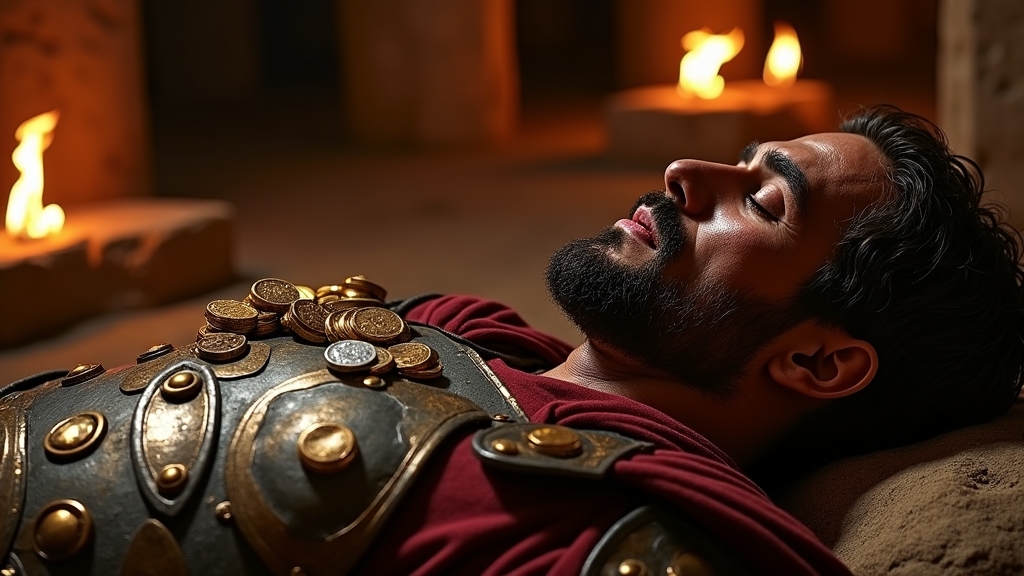
The tradition of leaving coins on headstones dates back centuries. It’s been done all over the world, from Europe to Asia to the Americas.
The most common theory is that the tradition started with the Roman Empire. Soldiers who died in battle would have coins placed in their mouths before burial. This was done as a way to ensure that the deceased soldier could cross the River Styx and enter the Underworld.
Yes, this sounds like a thrilling scene from a Hollywood movie, but it’s actually based on actual Roman customs. In ancient Rome, it was believed that the dead needed to pay Charon, the ferryman who transported souls across the River Styx, in order to enter the afterlife. The coins served as payment for this journey.
Of course, there are other theories about the origins of this tradition. Some say that the coins were left as a way to ensure that the dead would have enough money in the afterlife. Others believe that the coins were left as an offering to the gods in hopes that they would look favorably upon the deceased.
Whatever the origins of the tradition, it’s clear that leaving coins on headstones has been a part of human culture for centuries. And while the reasons for doing it have changed over time, the act itself remains a way to pay respects to the dead.
How This Tradition Found Its Way to America
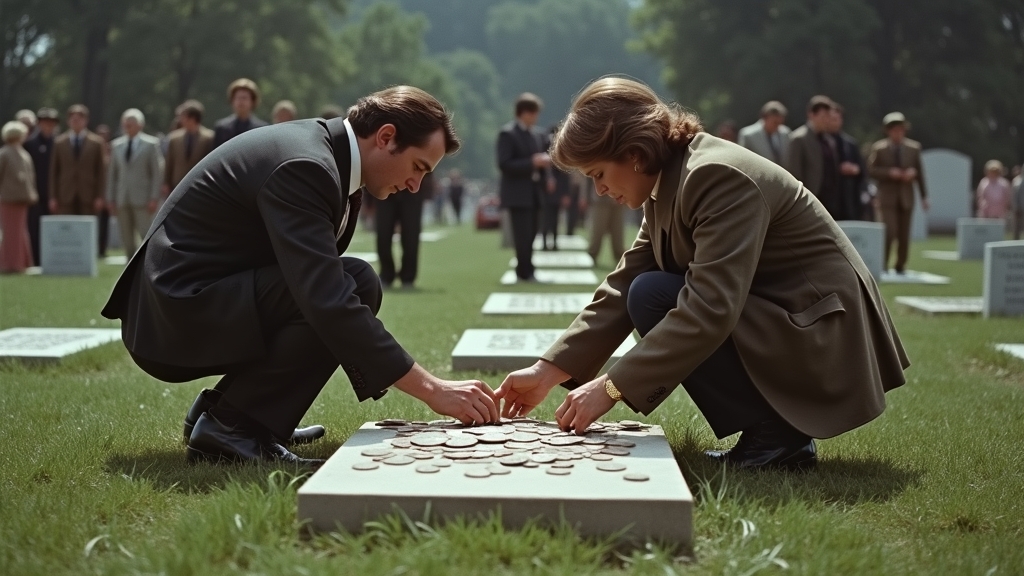
You’re probably wondering how this tradition made its way to America. After all, the United States is a relatively young country, and the tradition of leaving coins originated from places like the Roman Empire and medieval Europe, which are thousands of miles away.
So how did it become such a common practice in the United States? The answer can be traced back to the Vietnam War.
During the war, there was an upheaval and political divide over the controversial conflict. Some Americans supported the troops, while others were critical of the war and the government’s handling of it.
This division was on full display when soldiers started returning home from the war. Some were welcomed as heroes, while others were met with protests and even violence.
It was during this time that the tradition of leaving coins on headstones began to take hold in the United States. It started as a way for people to show support for the fallen troops and communicate with their families that someone was thinking of them.
Many people refrained from personally meeting with the families of fallen soldiers because they wanted to avoid any uncomfortable arguments relating to the war.
Leaving coins on headstones became a way for people to express their condolences without having to say anything at all.
As time went on, the tradition continued, and eventually, it became common practice to leave coins on the headstones of all deceased soldiers — not just those who died in Vietnam.
Coin Denominations and Their Meanings
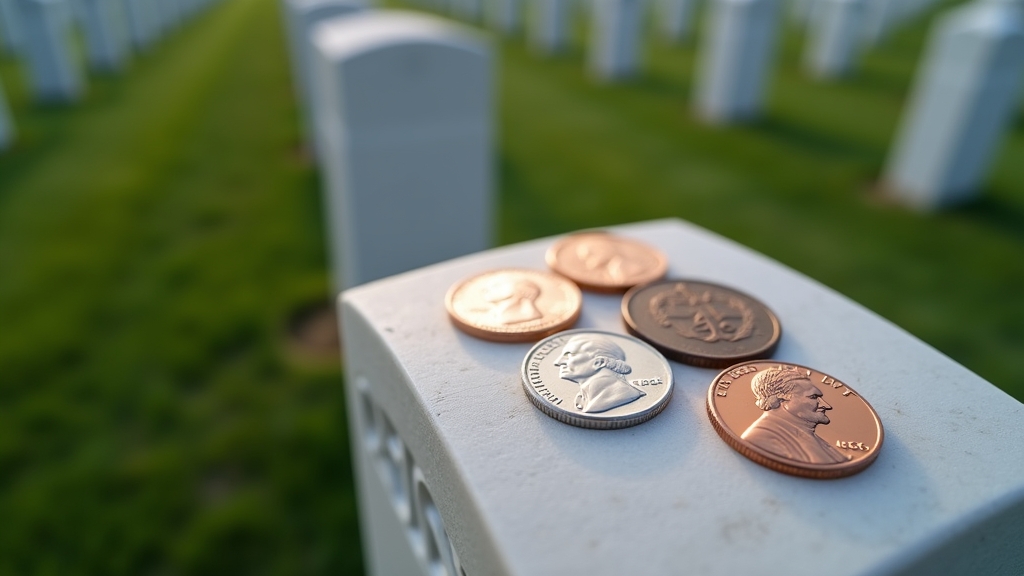
Let’s say you’re visiting a war cemetery. You see the endless rows of headstones, each bearing the name of a fallen soldier. You don’t know any of them, but you feel a deep respect for each and every one of them.
You want to do something to show that respect, but you see different coins on different headstones and are unsure what each one means.
Below, we explore the different coin denominations and their meanings.
Pennies
Leaving a penny at a deceased soldier’s (or any individual’s) headstone is the most common practice. The penny is a small, unassuming coin, but its symbolism is powerful. Pennies symbolize remembrance and respect.
They’re also a way of saying, “I was here,” and letting the deceased’s family know that someone is thinking of them.
Nickels
Nickels are the next most common coin to find on headstones. Like pennies, they’re a way of showing respect and remembrance. However, nickels have a slightly deeper meaning.
A nickel indicates that you went to boot camp with the deceased. It’s a way of showing that you were close to them and that you’ll never forget the time you spent together.
Dime
Dimes are left on headstones much less often than pennies or nickels, but they still hold a significant meaning.
A dime indicates that you served with the deceased in combat. It’s a way of showing that you were there with them until the very end and that their sacrifice will never be forgotten.
Quarter
Probably the least common coin to find on a headstone is a quarter. This is because quarters are left as a sign of the highest respect.
A quarter indicates that you were with the deceased when they died. This could mean that you were literally by their side, or it could mean that you were in the same unit as them and witnessed their death.
Either way, it’s a way of showing that their death had a profound impact on you and that you’ll never forget them.
What About Non-Military Headstones?
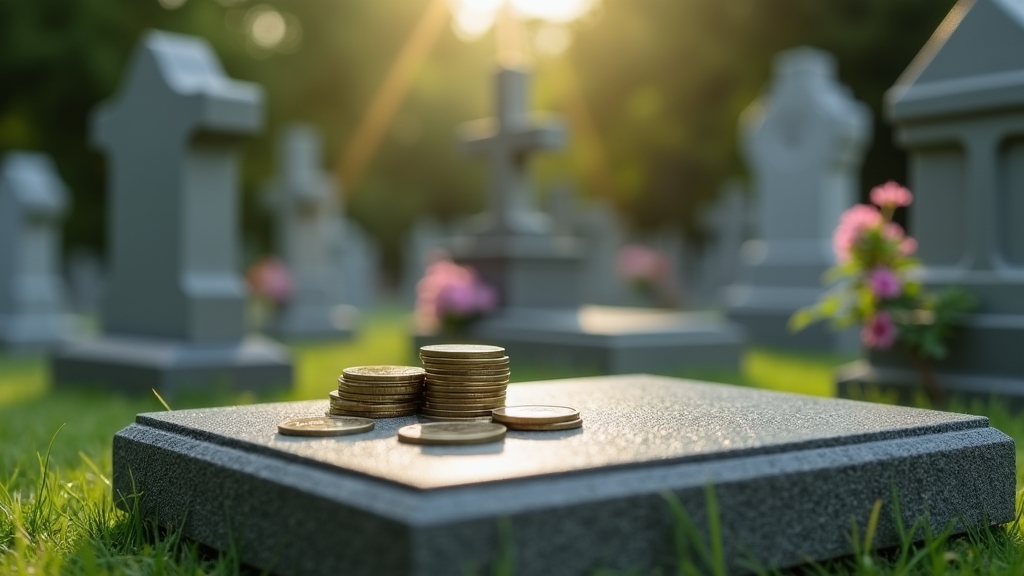
The tradition of leaving coins on headstones is most commonly associated with military cemeteries. However, it’s not limited to them.
Coins can be left on the headstones of civilians as well. The meaning is the same — they’re a way of showing respect and remembrance.
- A nickel means you and the deceased went to the same school.
- A dime means you worked with the deceased.
- A quarter means you were with the deceased during their final moments.
Of course, these are just general guidelines. The important thing is that you leave a coin that has personal meaning to you.
Where Do the Coins Go?
One common question people have is, “What happens to all the coins left on headstones?” The answer is that the coins are collected and donated to charities that support veterans.
The process of collecting the coins is usually done by volunteers. In some cases, the coins are carefully removed from the headstones by hand. In other cases, they’re simply swept up with a broom.
Either way, the coins are then taken to a local bank, where they’re exchanged for cash. The money is then donated to charities supporting veterans, such as the Wounded Warrior Project or the Veterans of Foreign Wars. Sometimes, the money is also used to fix the cemetery or buy new headstones.
Other Ways to Honor the Deceased
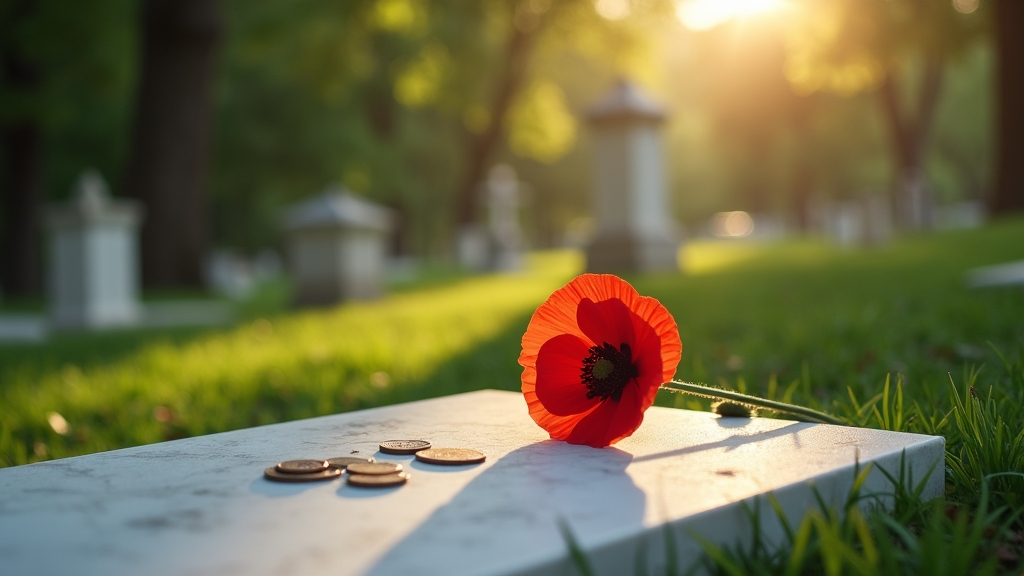
Of course, leaving coins on headstones is just one way to show respect for the deceased.
If you don’t have any coins on you or want to do something more, there are other things you can do. Here are a few ideas:
Wear a Red Poppy
If you want to honor the fallen in a more subtle way, you can wear a red poppy. The red poppy is the official flower of Veterans Day and Memorial Day in the United States. It’s also worn on Remembrance Day in Canada and Commonwealth countries.
The red poppy became a symbol of remembrance after World War I. In the poem “In Flanders Fields,” John McCrae wrote about how the red poppies growing on the battlefields were a sign of hope and life amidst all the death.
Leave Flowers
Another way to show respect is to leave flowers on the headstone. This is a common practice in many cultures and is a beautiful way to honor the deceased.
If you don’t have any flowers on hand, you can also leave a small bouquet at the cemetery office. They’ll make sure it gets placed on the headstone of your loved one.
Say a Prayer
If you’re religious, you can say a prayer for the deceased. This is a way of asking for their soul to be at peace and for their loved ones to be comforted. Whether the deceased is someone you know or a stranger, taking the time to say a prayer is a beautiful gesture of respect.
The Bottom Line
The tradition of leaving coins on headstones is a powerful one. It’s a way of showing respect, remembrance, and support for the families of fallen soldiers.
If you ever find yourself at a war cemetery, take a moment to reflect on the sacrifices made by the individuals buried there. And if you feel moved to do so, leave a coin on a headstone as a sign of respect.
